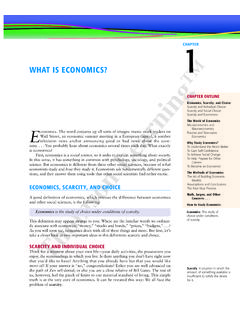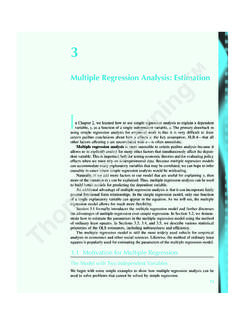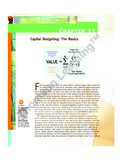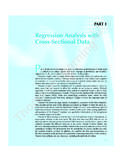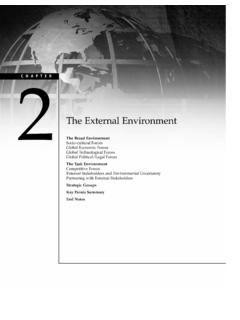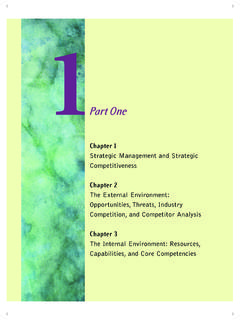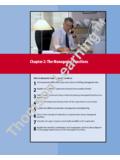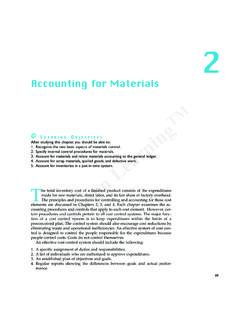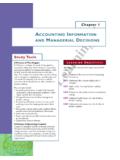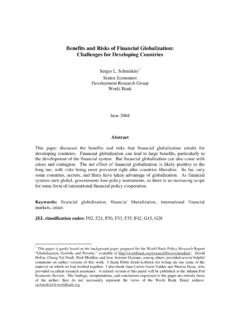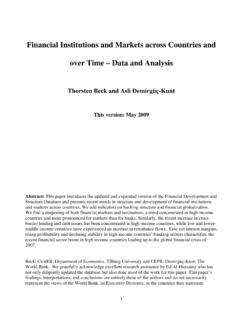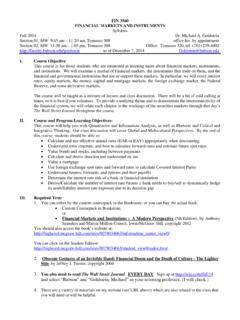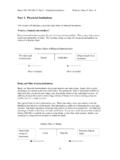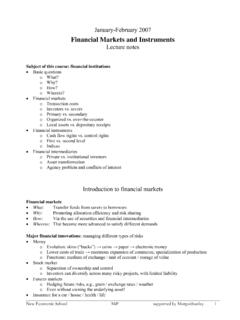Transcription of Motives for Investing in Foreign Markets - Cengage Learning
1 Thomson Learning Due to growth in international business over the last 30 years, variousinternational financial Markets have been developed. financial man-agers of MNCs must understand the various international financialmarkets that are available so that they can use those Markets to facilitate their international business specific objectives of this chapter are to describe the background and corporate use of the following international financialmarkets: Foreign exchange market Eurocurrency market Eurocredit market Eurobond market international stock marketsMOTIVES FORUSINGINTERNATIONALFINANCIALMARKETSS everal barriers prevent the Markets for real or financial assets frombecoming completely integrated.
2 These barriers include tax differentials,tariffs, quotas, labor immobility, cultural differences, financial reportingdifferences, and significant costs of communicating information acrosscountries. Nevertheless, the barriers can also create unique opportunitiesfor specific geographic Markets that will attract Foreign creditors andinvestors. For example, barriers such as tariffs, quotas, and labor immo-bility can cause a given country s economic conditions to be distinctlydifferent from others. Investors and creditors may want to do business inthat country to capitalize on favorable conditions unique to that coun-try. The existence of imperfect Markets has precipitated the internation-alization of financial Learning Motives for Investing in Foreign MarketsInvestors invest in Foreign Markets for one or more of the following Motives : Economic conditions.
3 Investors may expect firms in a particular Foreign countryto achieve more favorable performance than those in the investor s home country. For example, the loosening of restrictions in Eastern European countries created favorable economic conditions there. Such conditions attracted Foreign investors and creditors. Exchange rate expectations. Some investors purchase financial securities denominated in a currency that is expected to appreciate against their own. The performance of such an investment is highly dependent on the currencymovement over the investment horizon. International diversification. Investors may achieve benefits from international-ly diversifying their asset portfolio.
4 When an investor s entire portfolio does not depend solely on a single country s economy, cross-border differences ineconomic conditions can allow for risk-reduction benefits. A stock portfolio representing firms across European countries is less risky than a stock portfoliorepresenting fimrs in any single European country. Furthermore, access to Foreign Markets allows investors to spread their funds across a more diversegroup of industries than may be available domestically. This is especially true for investors residing in countries where firms are concentrated in a relativelysmall number of for Providing Credit in Foreign MarketsCreditors (including individual investors who purchase debt securities) have one ormore of the following Motives for providing credit in Foreign Markets : High Foreign interest rates.
5 Some countries experience a shortage of loanablefunds, which can cause market interest rates to be relatively high, even after considering default risk. Foreign creditors may attempt to capitalize on the higher rates, thereby providing capital to overseas Markets . Yet, relatively highinterest rates are often perceived to reflect relatively high inflationary expecta-tions in that country. To the extent that inflation can cause depreciation of the local currency against others, high interest rates in the country may be somewhat offset by a weakening of the local currency over the time period ofconcern. The relation between a country s expected inflation and its local currency movements is not precise, however, because several other factors caninfluence currency movements as well.
6 Thus, some creditors may believe that the interest rate advantage in a particular country will not be offset by a localcurrency depreciation over the period of concern. Exchange rate may consider supplying capital to countries whose currencies are expected to appreciate against their the form of the transaction is a bond or a loan, the creditor benefitswhen the currency of denomination appreciates against the creditor s home currency. International can benefit from international diversifi-cation, which may reduce the probability of simultaneous bankruptcy acrossborrowers. The effectiveness of such a strategy depends on the correlationhttp://Visit the latest informationfrom financial marketsaround the Learning between the economic conditions of countries.
7 If the countries of concern tendto experience somewhat similar business cycles, diversification across countrieswill be less for Borrowing in Foreign MarketsBorrowers may have one or more of the following Motives for borrowing in foreignmarkets: Low interest countries have a large supply of funds available com-pared to the demand for funds, which can cause relatively low interest may attempt to borrow funds from creditors in these countriesbecause the interest rate charged is lower. A country with relatively low interestrates is often expected to have a relatively low rate of inflation, which can placeupward pressure on the Foreign currency s value and offset any advantage oflower interest rates. The relation between expected inflation differentials andcurrency movements is not precise, however, so some borrowers will choose toborrow from a market where nominal interest rates are low, since they do notexpect an adverse currency movement to fully offset this advantage.
8 Exchange rate a Foreign subsidiary of a MNCremits funds to its parent, the funds must be converted to dollars and aresubject to exchange rate risk. The MNC will be adversely affected if the foreigncurrency depreciates at that time. If the MNC expects that the Foreign currencymay depreciate against the dollar, it can reduce the exchange rate risk by havingthe subsidiary borrow funds locally to support its business. The subsidiary willremit less funds to the parent if it must pay interest on local debt before remit-ting the funds. Thus, the amount of funds converted to dollars will be smaller,resulting in less exposure to exchange rate risk. If the parent needs to borrow funds for its own purposes, it may pursue amore aggressive strategy and borrow a Foreign currency that is expected to depreci-ate.
9 In this case, the parent would borrow that currency and convert it to dollars foruse. The value of the Foreign currency when converted to dollars would exceed thevalue when the MNC repurchases the currency to repay the loan. The favorable cur-rency effect can offset part or all of the interest owed on the funds borrowed. Sucha strategy may be especially desirable if the Foreign currency has a low interest ratecompared to the interest Foreign exchange market allows currencies to be exchanged in order to facili-tate international trade or financial transactions. MNCs rely on the foreignexchange market to exchange their home currency for a Foreign currency that theyneed to purchase imports or use for direct Foreign investment.
10 Alternatively, theymay need the Foreign exchange market to exchange a Foreign currency that theyreceive into their home currency. The system for establishing exchange rates haschanged over Learning History of Foreign Exchange The system used for exchanging Foreign currencies has evolved from the gold standard, to an agreement on fixed exchange rates, to a floating rate 1876 to 1913, exchange rates were dictated by the gold standard. Each currency was convertible into gold at a specified rate. Thus, the exchange rate between two currencies was determined by their relative convert-ibility rates per ounce of gold. Each country used gold to back its World War I began in 1914, the gold standard was suspended.
